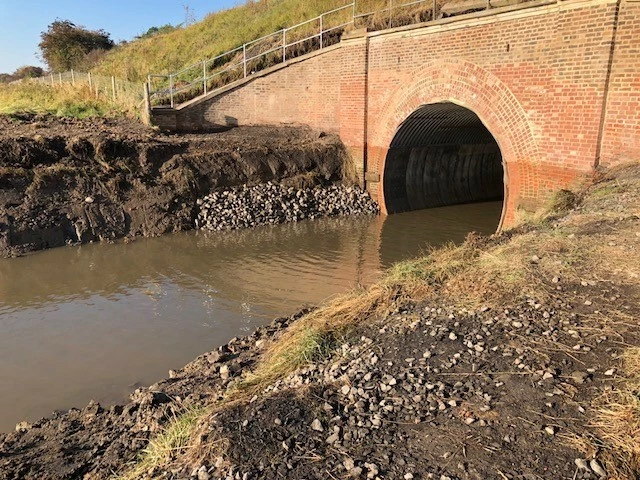
Member Article
Bridge over troubled waters
A crumbling rail bridge located in a town’s ‘best kept secret’ area can now continue to safely carry passengers to their destination.
It’s an area renowned for its natural beauty – but for the very same reason expert engineers worked in challenging conditions to support the failing Victorian rail underbridge over Greatham Beck, on the outskirts of Hartlepool in the Tees Valley.
A range of specialist organisations – including Seymour Civil Engineering and AmcoGiffen – came together to complete the project despite being its difficult tidal location and abundant wildlife including kingfisher, woodpeckers and owls.
Chris Byrne, Contracts Manager for Seymour Civil Engineering, said: “The project has run for 12 weeks and was taken on in collaboration with our sister company AmcoGiffen, which had been contracted by its client Network Rail, to strengthen the Greatham Beck rail bridge.
“The whole area is teeming with wildlife so we also worked with the Environment Agency to ensure its protection.
“But despite dealing with the very intricate challenges we faced with tides and wildlife, we finished the project on time and to budget.”
The underbridge is located between Billingham railway station and Seaton Carew railway station, but no travel was affected during the work, which included installing a steel ‘liner’ under the bridge, masonry repairs and repairing fractures.
Nick Hill, Senior Project Manager at AmcoGiffen, explained more about the work required to support the structure.
He said: “The arch structure had deteriorated to such an extent that it was necessary to carry out major works.
“For this kind of structure it’s normal to line the arch with corrugated steel structure to effectively make the brick arch redundant. As the brick arch deteriorates over the years the steel liner will take more and more of the load.
“The main challenge was working in an environmentally sensitive area requiring various consents, tidal fluctuations and water management.
“The tidal conditions were challenging due to the large differences in level from low to high tide. At times of very high tide the water was able to flow over our dam, but the water drained back out when the tide receded allowing us to continue working.”
An engineering team of around 20 worked on the project which took 12 weeks to complete, starting in mid July and completing at the end of October.
Nick added: “The project was a very successful example of how teams wanting to work together and communicate well can deliver a high-quality project to budget and programme.”
This was posted in Bdaily's Members' News section by Publicity Seekers .
Enjoy the read? Get Bdaily delivered.
Sign up to receive our daily bulletin, sent to your inbox, for free.




 test article 123456789
test article 123456789
 hmcmh89cg45mh98-cg45hm89-
hmcmh89cg45mh98-cg45hm89-
 test456456456456456456
test456456456456456456
 test123123123123123123
test123123123123123123
 test xxxdiosphfjpodskhfiuodsh
test xxxdiosphfjpodskhfiuodsh
 Savour the flavour: North Tyneside Restaurant Week returns for 2024
Savour the flavour: North Tyneside Restaurant Week returns for 2024
 Six steps to finding the right buyer for your business
Six steps to finding the right buyer for your business
 Stephen signs off on a special night
Stephen signs off on a special night
 Life’s a Peachaus: Gillian Ridley Whittle
Life’s a Peachaus: Gillian Ridley Whittle
 Making a splash: Phil Groom
Making a splash: Phil Groom
 Making workplace wellbeing a priority
Making workplace wellbeing a priority
 A record of delivery, a promise of more: Ben Houchen
A record of delivery, a promise of more: Ben Houchen